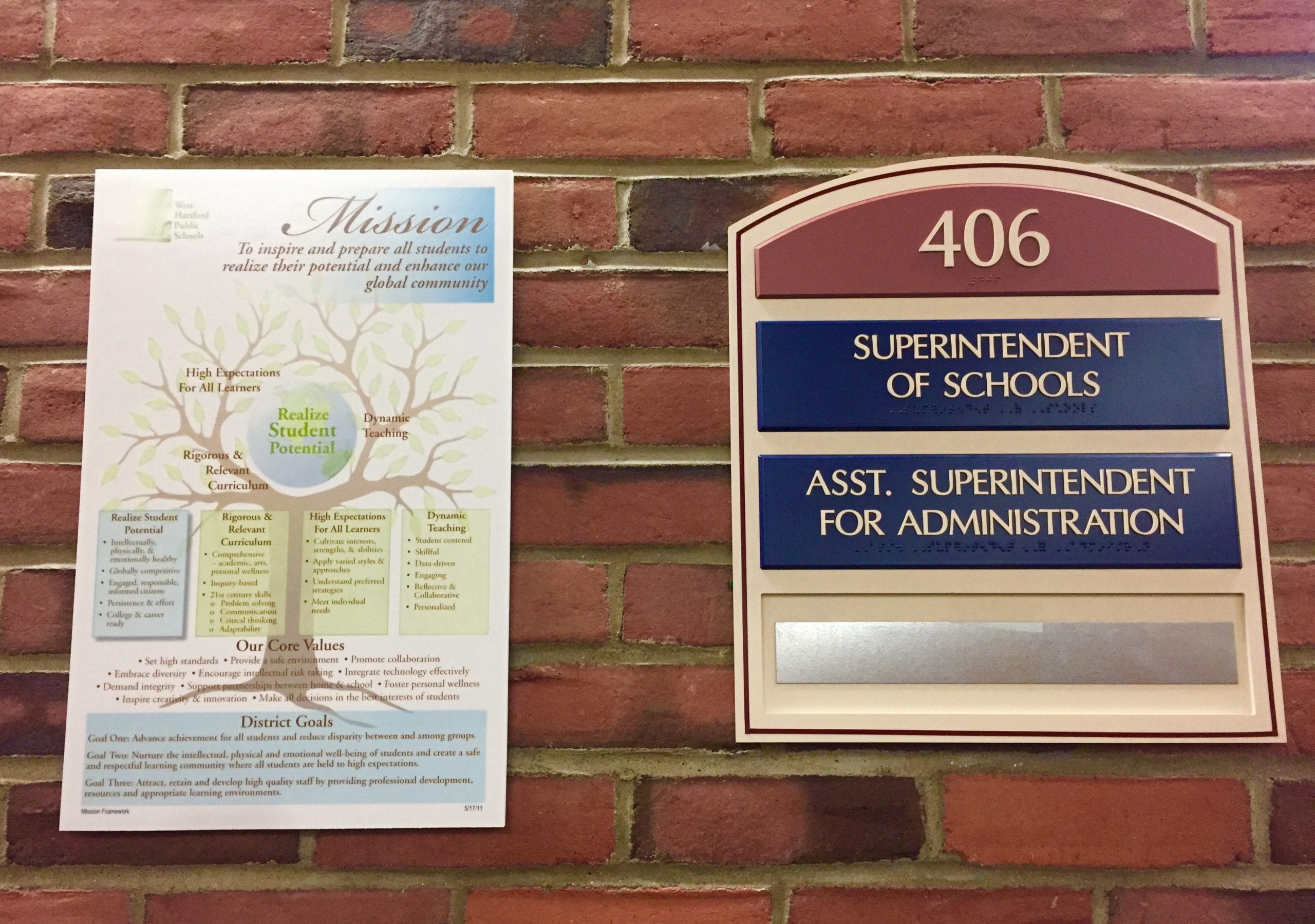West Hartford Board of Education Narrows Options, Will Vote on Changing School Start Times

Audio By Carbonatix

West Hartford Public Schools Superintendent's Office. Photo credit: Ronni Newton (we-ha.com file photo)
On Tuesday night the Rethinking School Start Time Committee provided the West Hartford Board of Education with an impact study of various school start time options that had been requested at its June meeting, and the Board will make its final decision at its Nov. 20 meeting.
By Ronni Newton
The Rethinking School Start Times (RSST) committee was back in front of the West Hartford Board of Education Tuesday night, presenting the benefits and impacts of four specific scenarios that had been identified for further study during the Board’s June 5 meeting.
The June 5 report included analysis of the results of a stakeholder survey and was to have been the final report, but after discussion the Board determined that further study was needed before any decision to move forward should be made.
Tuesday’s report, presented by Director of Secondary Education Anne McKernan, who chairs the RSST committee, and Assistant Superintendent for Curriculum, Instruction and Assessment Paul Vicinus, provided the requested summary of the benefits and impact of all four options and a list of immediate next steps to implement each scenario.
Previous reports by the RSST committee had addressed transportation issues, athletics, and the science of adolescent sleep habits, among other topics.
The Oct. 16 report will be the final one, and the Board plans to vote at its Nov. 20 meeting. If a change is made, it would likely be implemented for the start of the 2019-20 academic year.
Following about two hours of discussion on Tuesday night, the Board decided that the choice will be made between option no. 2 (outlined below) – where middle school and high school start times will flip, and all start times will be delayed – or leaving school start times unchanged.
The four scenarios were:
- Middle schools 8 a.m.-2:50 p.m. (no change), high schools 8:30 a.m.-3:15 p.m. (one hour delay), and elementary schools 9 a.m.-3:50 p.m. (25 minute delay). This scenario impacts only the high schools and elementary schools.
- Middle schools 7:40 a.m-2:30 p.m. (20 minutes earlier), high schools 8:10 a.m.-2:55 p.m. or 8:15 a.m.-3 p.m. (40-45 minute delay), and elementary schools 8:40 a.m.-3:25 p.m. or 8:45 a.m.-3:30 p.m (5-10 minute delay). This scenario switches the start times of the middle and high schools, and adds a delayed start to all levels. There may be a possibility of a 5 or 10 minute adjustment to the actual times under this scenario, depending on bus scheduling.
- Delaying school start times on Wednesdays only for high schools and middle schools. Monday, Tuesday, Thursday, and Friday schedules would remain unchanged. On Wednesday, high school hours would be 9:45 a.m.-3:05 p.m. (2 hour and 15 minute delay), and middle school hours would be 10:15 a.m.-3:45 p.m. (2 hour and 15 minute delay). The Wednesday schedule for elementary schools would remain 8:35 a.m.-2 p.m.
- Retaining the current schedule of high schools 7:30 a.m.-2:15 p.m., middle schools 8 a.m.-2:50 p.m., and elementary schools 8:35 a.m.-3:20 p.m.
The complete report presented Tuesday night has been provided in PDF form below.
In addition to analyzing the benefits and impact of the four scenarios, the Board had requested information about the impact of the cost of transportation of West Hartford residents to private schools in town – which is required by law – if the private schools do not also change their start times.
Transportation was the topic of discussion in a report that the RSST committee presented to the Board of Education on May 1. At that time it appeared that if the town’s nine private schools did not also change their start times, the town might need to run eight or nine additional buses, at a cost ranging from $452,000-$510,000 for the year, according to the committee’s report.
Superintendent Tom Moore, who took on the task of reaching out the private schools, said that when he and other administrators looked at the bus schedule as a whole system, it became apparent that only four bus runs would conflict with the private schools, and the annual additional cost, in a worst case scenario, would be $94,012.
“Our partners were great in talking with us,” Moore said of the private schools, and if any decide to change their start times to coincide with the public schools, the cost could be further decreased.
“We are expecting students to get much more sleep in this scenario,” McKernan said of option no. 1, which would delay the high school start time by a full hour. The emotional benefits are clearly documented, she said, and while academic benefits are not really a goal, other towns that have implemented a similar schedule have seen an improvement in attendance.
Sports, as well as other extracurricular activities, would prove the biggest challenge under option no. 1. The default start time for most sports contests is 3:45 p.m., and students would lose learning time for some home and many away contests, McKernan said. Physical education classes have to be made up at another time, and science labs are difficult to make up as well.
Scheduling for sports that take place at outside facilities, like Rockledge Golf Course, Cornerstone, or Veterans Memorial Ice Rink, was also cited as a concern.
Other concerns noted with option no. 1 include how students would be able to take part in sports as well as other extracurriculars, and the danger for elementary school children, who would be dismissed at 3:45 p.m., having to get off the bus in the twilight at some times of the year.
With option no. 2, the challenges are similar but less dramatic. Students would gain some sleep, but not as much. “The biggest difference is that middle school students, some of whom are adolescents, are starting earlier,” she said.
Moore said that home sports contests would be less likely to require early dismissal under option no. 2, and many athletic directors would be willing to make a 10-15 minute adjustment, which would mitigate the athletics issue.
Option no. 3 would require professional development for middle and high school teachers on Wednesdays to be held from 7:15-9:15 a.m. instead of in the afternoon. It would also mean that departments that are K-12, like art, health, and special education, would lose their ability to regularly meet as a complete team. While McKernan said that there could be some benefits to sleeping in one day a week, Board Chair Cheryl Greenberg, who had just attended a conference on school start times, said that medical research presented indicated that it’s actually worse to sleep in for just one day because it upsets the circadian rhythms.
“The challenges here are that our students wouldn’t get the sleep benefits that we’ve been talking about for the last year,” McKernan said in reference to option no. 4 – doing nothing. Leaving the schedule as is would, however, allow the administration to turn its attention to the changes in the number of high school credits required for graduation, an increase that must be implemented for the class of 2023 which begins high school in the fall of 2019.
McKernan said that the RSST committee put extensive thought and effort into its research, and looked at every possible angle. “The problem is finding the sweet spot” with the least disruptions, she said.
In speaking with other districts around the state, she said that Wilton and Newtown are happy with the changes they made to school start times, while Greenwich had a different experience and while they did not revert to the former start time, they created an “opportunity block” for the last 30 minutes of the day so that athletes would not miss instructional time for contests.
Four residents spoke before the meeting, in strong support of later school start times as benefits to mental and physical health.
Resident Sarah Raskin, who is a professor of psychology and neuroscience at Trinity College and has been one of the foremost proponents of delaying school start times at West Hartford’s high schools, noted that a later start time would bring many public health benefits. She said that the current start times are not “magical” and were the product of the oil crisis in 1970s. “I hope that if you do come to a vote you will vote ‘yes’ to reduce this catastrophic health problem. … Be a leader, tell our neighbors that in West Hartford we care about the health, safety, and well being of our students,” Raskin said.
Board members were also very outspoken about their opinions on the issue.
Republican Mark Zydanowicz said that he found it “hyperbole” to assert that an increase in mental health problems could be attributed to school start times. In addition, he said that the physical and psychological changes of adolescence take place between the ages of 9 and 12, but that’s not being addressed in any of the scenarios.
“Grades don’t suffer. We have more accolades in West Hartford than ever before about our school system and how we succeed both in the classroom and on the field,” Zydanowicz said. “We are at the top of the game academically.” Changing school start times might help one problem, but would create problems for kids who play sports.
Democratic board member Lorna Thomas-Farquarson, who has a doctorate in clinical psychology, responded to Zydanowicz’s comments about the reference to mental illness, and said that we should be careful in referencing an increase in mental illness. “I take it as there is an increased awareness of mental health concerns that likely were already there,” she said.
She added that in terms of the science, human brain function is not completely developed until someone reaches their mid-20s. “During the period of adolescence the amygdala is the part of the brain, that’s where the emotions are, that’s the part that is strongest.” The age range is actually much longer, she said.
Republican Rob Levine said that there are more things to consider, particularly how other after school activities would be impacted.
West Hartford Public Schools are obviously excelling under the current schedule, Levine said, referencing a glowing report on AP Exams that had been presented earlier in the evening.
“All the science says 8:30 is better for high school but I have to say reading this [report by the RSST committee] that the 8:10 alternative might be far less negatively impactful than the 8;30,” Greenberg said. While it might be better for student health, there would be far less conflict with option no. 2, she said.
“Ideally we would want to start school at 8:30 because that’s best for the kids,” Democrat Deb Polun said, “but realistically I have concerns.” Change is hard she said, but that doesn’t mean science should be ignored.
Although Democrat Dave Pauluk pushed for the Board to consider option no. 1 – the “reach” option that would have provided the students with the opportunity for the most sleep, he ultimately agreed that something would be better than nothing.
Levine said that he’s not convinced that the majority of people in town want school start times to change, or that it would benefit a majority of people in West Hartford. “I caution you to be more thoughtful about what we don’t currently know,” he said.
Polun said that people should be encouraged to speak out, and Levine agreed.
“If you feel strongly that the school start time should not change you should come out, he said. “I implore you, spread the word.”
At the public comment session at the end of the meeting, resident Diana Macpherson did speak out, and said that she has concerns with the unavoidable disruption that would be triggered with any of the change options. Despite the science, she said, “The disruption to families has to be taken into consideration.”
Although the number of people permitted to speak to the Board during public comment about a single topic is limited to seven, Greenberg urged anyone who has a strong opinion to email [email protected].
Editor’s Note: This story has been updated from the original version.
Like what you see here? Click here to subscribe to We-Ha’s newsletter so you’ll always be in the know about what’s happening in West Hartford!
 Loading...
Loading... 



This is a solution looking for a problem. Adding $400k or even 94k for additional bus runs is a waste of money.
Unless this can be done at no incremental cost it should be discarded.
If 8 buses cost $452,000, how would 4 buses cost only $94,012? It sounds like the cost is being underrepresented to get the program through.
It may depend on the size of the buses that are needed. Mini buses are much less expensive.
Vote republican. This is what wasting time and taxpayer money has come to. Start with the governor and work down to the local level.
How is making middle school start earlier solving the sleep problem???
“The American Academy of Pediatrics has recommended that middle and high schools start at 8:30 a.m. or later to give students the opportunity to get the amount of sleep they need, but most American adolescents start school too early.”
https://www.cdc.gov/features/school-start-times/index.html
As a pediatrician in West Hartford, I can tell you that we physicians see very clearly the impact of stress and sleep deprivation on our students. A delayed school start time begins to address the issue, but it is much more complicated than just that. Is it possible to allow athletes to count their sport as their PE requirement and have that “practice” and competition time be the final period of the day?
I also find it quite disturbing that there is not a 20-25 minute “lunch” period built into the day. Our high achieving community is neglecting to address the importance of a little break midday that allows our students the opportunity to eat while not in class, take a deep breath, and not be forced to choose between an elective and a 50 minute “lunch”. Most, if not all, of our surrounding and equally high achieving towns are able to manage this.
I am aware there are many confounding variables; taxpayer costs, teachers contracts, before and after school care, bus schedules, etc. I hope the board is able to put the health and well being of our students at the top of the list of things to consider. I will try to find a schedule for board meetings so I can attend to be better informed about these issues and offer whatever medical insights you may wish to hear.
[…] I knew it was more than that and I actually stayed home sick on Tuesday night and covered the Board of Education meeting and discussion on changing school start times by watching it on WHC-TV. I watched live, but I still feel guilty when I don’t attend in […]
[…] do, in the worst case scenario the additional buses would cost the district $94,012 annually (We-Ha.com). While this seems like a lot, in reality it represents just more than one percent of the current […]
[…] its Oct. 17 meeting, after several hours of discussion, the Board ruled out two other proposed options that had been under consideration, and decided that it […]